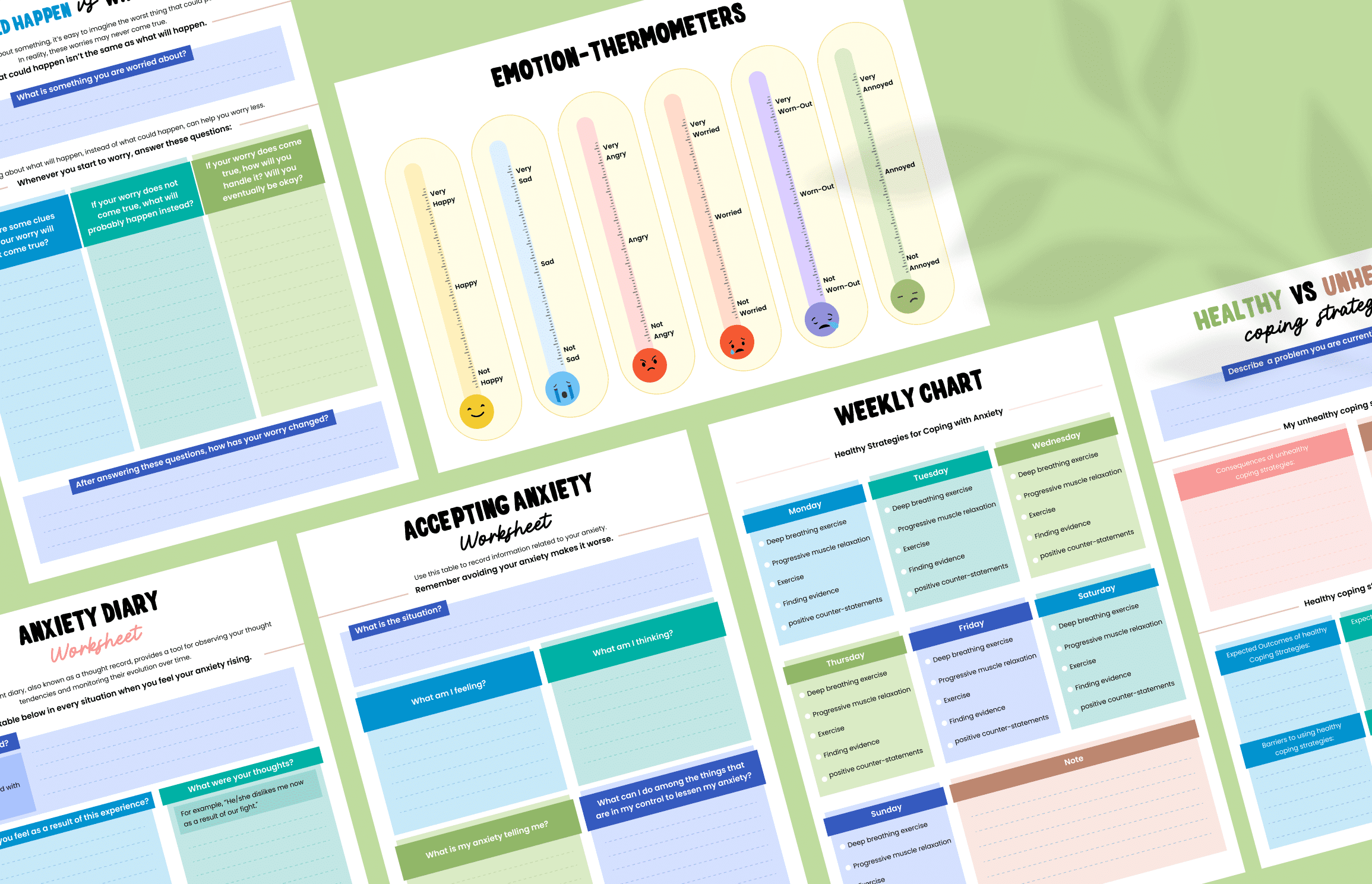Top Strategies and Worksheets for Effective Anxiety Management
Anxiety management is crucial for maintaining mental health and well-being. Structured worksheets can help individuals understand, track, and manage their anxiety effectively. This guide explores practical strategies and essential worksheets to help you manage anxiety, fostering a sense of calm and control in your life.
The Importance of Anxiety Management
Anxiety is a natural response to stress and can be beneficial in some situations. However, chronic anxiety can interfere with daily life and lead to mental health issues. Understanding and addressing anxiety is the first step towards managing it effectively. Effective anxiety management can lead to:
- Improved Mental Health: Reduced anxiety levels can alleviate symptoms of depression and enhance overall mental health.
- Enhanced Quality of Life: Managing anxiety allows for better participation in daily activities and relationships.
- Increased Resilience: Effective strategies help in coping with stress and unforeseen challenges.
Signs of Anxiety
Recognizing the signs of anxiety is essential for timely intervention and management. Common signs include:
- Persistent Worry: Excessive worry about everyday situations.
- Physical Symptoms: Experiencing symptoms like restlessness, fatigue, muscle tension, or sleep disturbances.
- Avoidance Behavior: Avoiding situations that trigger anxiety.
- Difficulty Concentrating: Finding it hard to focus on tasks.
Strategies for Anxiety Management
Consider incorporating these strategies into your anxiety management routine:
Mindfulness and Meditation
Tip: Mindfulness and meditation practices can help you stay present and reduce anxiety.
- Practice: Dedicate a few minutes each day to mindfulness exercises or meditation. Focus on your breath and let go of intrusive thoughts.
Physical Activity
Tip: Regular exercise is a powerful way to combat anxiety.
- Routine: Incorporate physical activities such as walking, jogging, yoga, or any other form of exercise you enjoy into your daily routine.
Balanced Diet
Tip: Nutrition plays a crucial role in mental health.
- Diet: Maintain a balanced diet rich in fruits, vegetables, whole grains, and lean proteins. Avoid excessive caffeine and sugar.
Adequate Sleep
Tip: Quality sleep is essential for anxiety management.
- Routine: Establish a regular sleep schedule. Ensure you get 7-9 hours of restful sleep each night.
Seek Professional Support
Tip: Don’t hesitate to seek help from a mental health professional when needed.
- Therapy: Consider therapy options such as cognitive-behavioral therapy (CBT) to develop effective anxiety management techniques.
Practical Activities for Anxiety Managing
Incorporating structured worksheets into your anxiety management plan can provide significant benefits. Here are some practical activities, each paired with a useful worksheet to help you manage anxiety effectively:
Practice Acceptance
Tip: Accepting anxiety can reduce its impact. Acknowledge your feelings without judgment to better manage your anxiety.
- Tool: Accepting Anxiety Worksheet
- How to Use: Write down specific situations that trigger your anxiety. Accept these feelings as a part of your experience without trying to change them. Reflect on how accepting your anxiety changes your perception and reaction to these triggers.
This worksheet is available now!
Keep an Anxiety Diary
Tip: Tracking your anxiety can help you identify patterns and triggers.
- Tool: Anxiety Diary
- How to Use: Record the date, time, and situation when you felt anxious. Note your thoughts and physical sensations during these moments. Review your entries regularly to identify patterns and triggers.
This worksheet is available now!
Weekly Reflection
Tip: Regularly reflecting on your anxiety helps spot trends and evaluate the effectiveness of coping strategies.
- Tool: Weekly Anxiety Log
- How to Use: Summarize your anxiety levels, triggers, and coping mechanisms used throughout the week. Assess which strategies worked and which didn’t. Adjust your approach based on your reflections for better management in the coming week.
This worksheet is available now!
Gauge Your Emotions
Tip: Understanding the intensity of your emotions can help anxiety management more effectively.
- Tool: Emotion Thermometer
- How to Use: Use a scale from 1 to 10 to rate your anxiety and other emotions. Regularly note your ratings to see how your emotional state fluctuates. Recognize patterns that might indicate triggers or effective coping mechanisms.
This worksheet is available now!
Differentiate Coping Mechanisms
Tip: Identifying healthy and unhealthy coping mechanisms is crucial for effective anxiety management.
- Tool: Healthy vs. Unhealthy Coping Mechanisms Worksheet
- How to Use: Write down all the ways you cope with anxiety. Identify which methods are healthy (e.g., exercise, meditation) and which are unhealthy (e.g., avoidance, substance use). Develop a plan to replace unhealthy coping mechanisms with healthier alternatives.
This worksheet is available now!
Challenge Irrational Thoughts
Tip: Replacing negative self-talk with realistic perspectives can reduce anxiety.
- Tool: What Could Happen vs. What Would Happen Worksheet
- How to Use: Write down a situation that causes anxiety. List the worst-case scenarios you fear. Counter these fears with logical, realistic outcomes. Reflect on how considering realistic outcomes can reduce anxiety.

This worksheet is available now!
Anxiety management is a continuous process that requires understanding, tracking, and employing effective coping strategies. By utilizing these essential worksheets—Accepting Anxiety Worksheet, Anxiety Diary, Weekly Anxiety Log, Emotion Thermometer, Healthy vs. Unhealthy Coping Mechanisms Worksheet, and What Could Happen vs. What Would Happen Worksheet—you can gain better control over your anxiety and improve your overall well-being. Additionally, incorporating mindfulness, regular physical activity, a balanced diet, adequate sleep, and professional support can further enhance your anxiety management efforts. Start integrating these tools and strategies into your routine today, and take a proactive step towards managing anxiety effectively.
You might also like to read these 100 positive affirmations for anxiety relief








